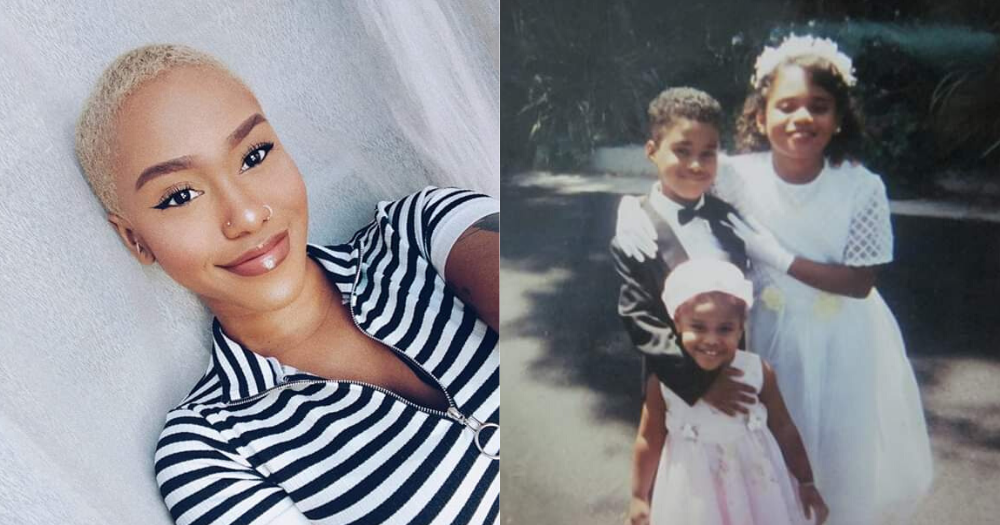Recent events in the U.S., catalysed by the death of George Floyd after a police officer knelt on his neck for nearly nine minutes, have sent reverberations around the world.
Speaking to Mothership, 23-year-old Singaporean Tabitha Teresa Thompson shares how the events in the U.S. are deeply personal and heart-breaking, and how racism affected her life growing up in Singapore.
 Photo courtesy of Tabitha Thompson.
Photo courtesy of Tabitha Thompson.
Growing up in two cultures
Thompson was born in Singapore to an African-American father and a Singaporean Indian mother.
Her parents moved her and her two older siblings to the U.S. when Thompson was one year old. She grew up moving around the country quite a lot, living in Michigan, Texas, California, and Florida.
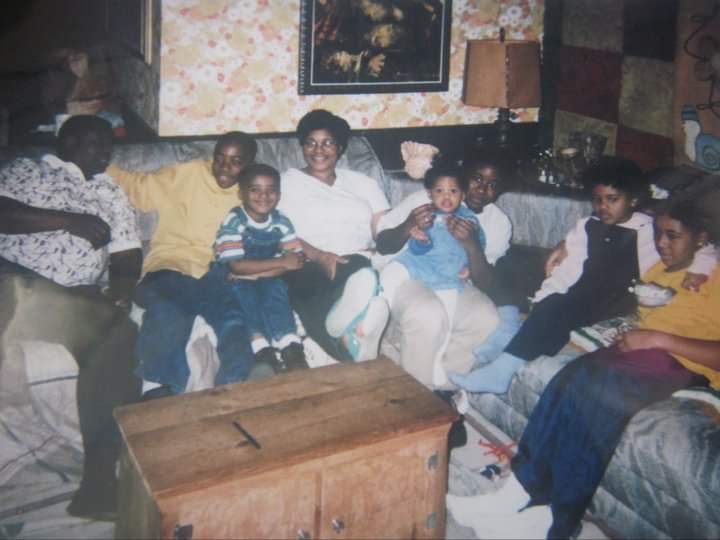 Thompson with her African-American side of her family. Photo courtesy of Tabitha Thompson.
Thompson with her African-American side of her family. Photo courtesy of Tabitha Thompson.
However, when Thompson was eight years old, her father decided to move their family back to Singapore, fearing the gun violence and racism that his children might face in the States.
Back in Singapore, Thompson began attending Tanjong Katong Primary School, which had a large proportion of international students.
“It wasn't bad at all, because I had other black kids in the school, there were [students from] different parts of Asia, so it wasn't so bad.”
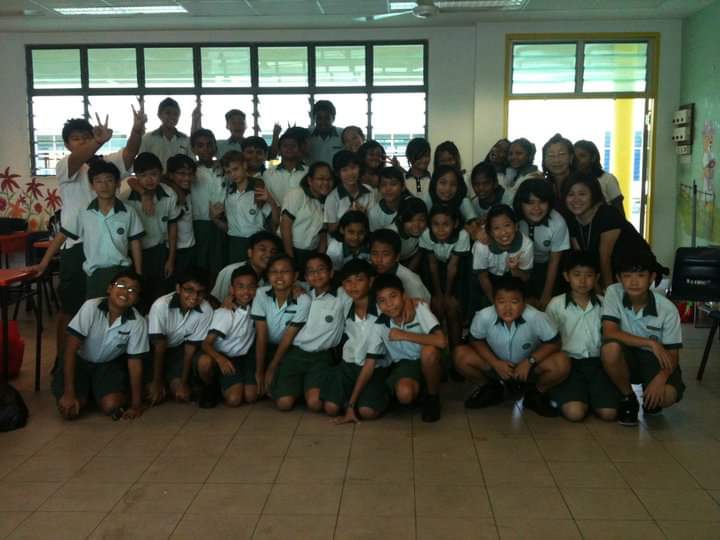 Tanjong Katong Primary School. Photo courtesy of Tabitha Thompson.
Tanjong Katong Primary School. Photo courtesy of Tabitha Thompson.
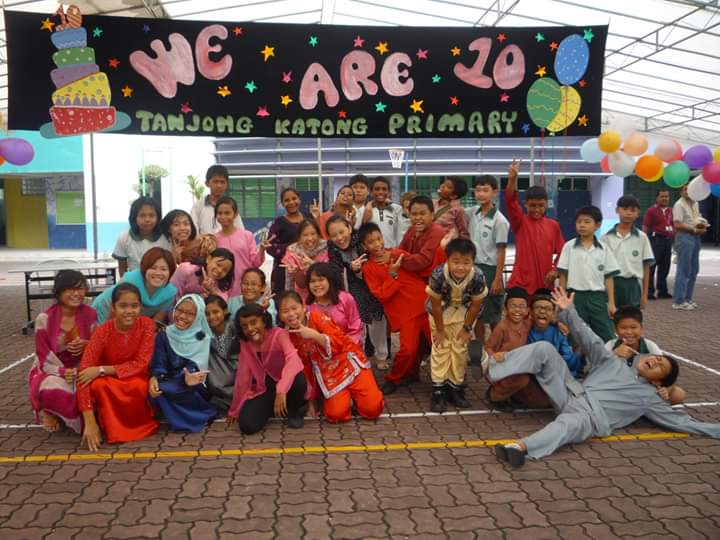 Racial Harmony Day in primary school. Photo courtesy of Tabitha Thompson.
Racial Harmony Day in primary school. Photo courtesy of Tabitha Thompson.
Things changed, however, when she entered secondary school, where the majority of her classmates were Singaporean Chinese, with some Malay students as well.
"When I went to secondary school, that was a big shock for me. Because you know, it's like, I'm [going from] seeing other black kids in school every day to being the only black kid in school."
And that, she says, was when the racism really began.
“I feel like people think, just because we're a multi-racial country, we don't have racism," she explains. "But, like, you know, it's callously out there.”
Racially-motivated bullying
Thompson explains that her classmates would make fun of her dark skin and her hair:
“When I had longer hair, I would always tie it into a ponytail, so it's like, just a big puff. And they would always stick things inside my hair.”
At the time, the extremely quiet girl didn't know how to stand up for herself, and so instead, she would just stay quiet or laugh along.
“In front of them, you know, you don't want to get upset. So I would just, like, keep quiet. Give them like a fake laugh.”
The teasing also took a toll on her self-image. She would go home and tell her parents that she wanted to change her hair:
“I don't want to have curly hair. I want to straighten my hair. I want to be like all the other girls — the Chinese girls — in class.”
The N-word
Secondary school was also when other students started using the N-word, a word that has a painful history of racism, slavery, and white supremacy in the United States.
You can read more about the use of the word, as well as the appeal of another mixed black individual in Singapore to non-black Singaporeans to refrain from using it, here:
Some of her classmates might not have known any better ("They're like, okay, should I call you black? Or should I call you African? Or like…?") or may have seen it on TV and thought that it was okay to say, Thompson shares.
But there were also people who knew exactly what they were doing:
“There are still some ignorant people that, I'm pretty sure they know the meaning of it, but they still insist on using it.”
Even though the N-word has been reclaimed by many black individuals as a way of subverting the power structures that allowed it to be used in a harmful way, there is still debate within the black community about the use of the term by their own people.
For instance, Thompson’s father refrains from using the N-word. He does not like his children saying it, because of its historical background.
"He would just say, ‘That's what they were called during slavery. It has a history to it. So, it's meant to dehumanize black people, so why say it?’"
Bullying and racism took a toll
In the face of the teasing and mocking that continued through secondary school, Thompson felt quite helpless.
Looking back now, she wishes she had spoken up.
At the time, her teachers didn’t step in to help her, either. In fact, Thompson recalls one teacher in particular who focused on the completely wrong issue.
When Thompson’s classmates made jokes about black people, the teacher, who happened to be Singaporean Chinese, did not reprimand them, choosing instead to chastise Thompson when the latter told her classmates to shut up.
Soon, the incessant bullying and the lack of support took a toll on Thompson. She began skipping school, attending only two or three times per week.
“…I just felt like, what's the point of me going to school?”
She struggled academically too.
“My grades were like… my grades were horrible!”, she admits, laughing. “I think only English and literature [were] the only subjects I was really good at.”
By the time she was halfway through Secondary Four, Thompson wanted to drop out and pursue a makeup diploma, as she has been passionate about beauty since a young age.
However, her older brother implored her to at least finish Secondary Four, which she did.
Thompson couldn’t make it to Secondary Five, as her math was “really bad”, and while she had the option to go to ITE, her mother encouraged her to think about what she wanted to do:
“My mom was like, ‘If you want to take a break from school, it's fine. Just go out and work if you want. Take a gap year.’”
“But then, from that one year, it turned into more,” Thompson adds, laughing.
Being a black adult in Singapore
Fresh out of secondary school, Thompson took on a number of part-time jobs in retail and F&B.
Thankfully, ever since she left the petty confines of secondary school meanness, Thompson hasn’t had to deal with as much overt racism, such as being labelled the N-word:
“I guess it's different from being a black kid in Singapore and being a black adult in Singapore.”
However, that didn’t mean that she was safe from racial ignorance.
For example, while working at a café, Thompson’s boss at the time — who was not Indian — called her a “fake Indian” after finding out that she didn’t speak Tamil.
"I was like, huh? What does that even mean? My mom's Indian, so how am I fake? I was so pissed off. How are you gonna call me fake? It's in my blood."
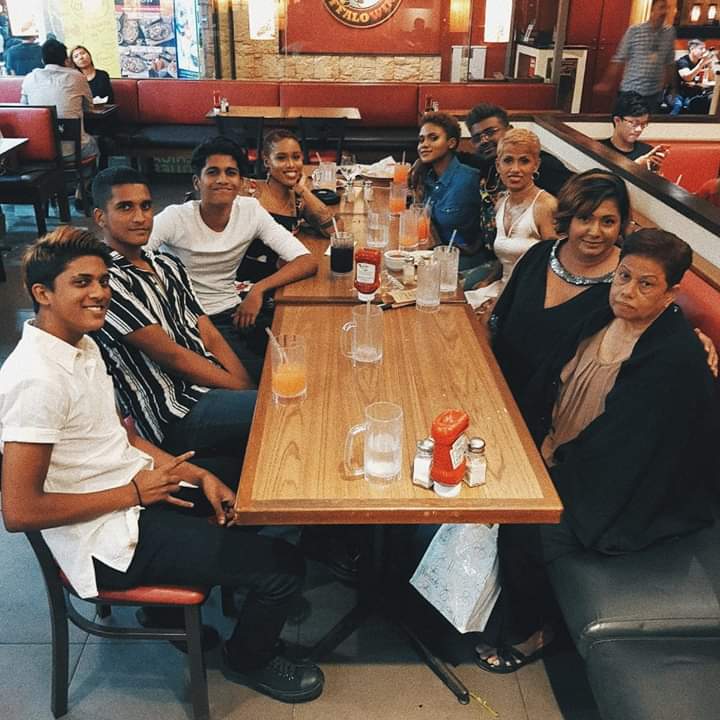 Thompson's Singaporean side of the family. Photo courtesy of Tabitha Thompson.
Thompson's Singaporean side of the family. Photo courtesy of Tabitha Thompson.
Thompson also faced racial discrimination when applying for jobs:
“When it's part-time jobs, it's okay. But I feel like, when you apply for full-time jobs, every single time I went, their requirement was like, ‘Oh, we can’t hire you because you don’t speak Mandarin.’
And I've actually had people tell me, like, ‘Oh, you're not Chinese, so we can't hire you.’”
This was especially true in the beauty industry. Most nail salons that Thompson applied to, other than her current employer, The Nail Social, had a Mandarin-speaking requirement.
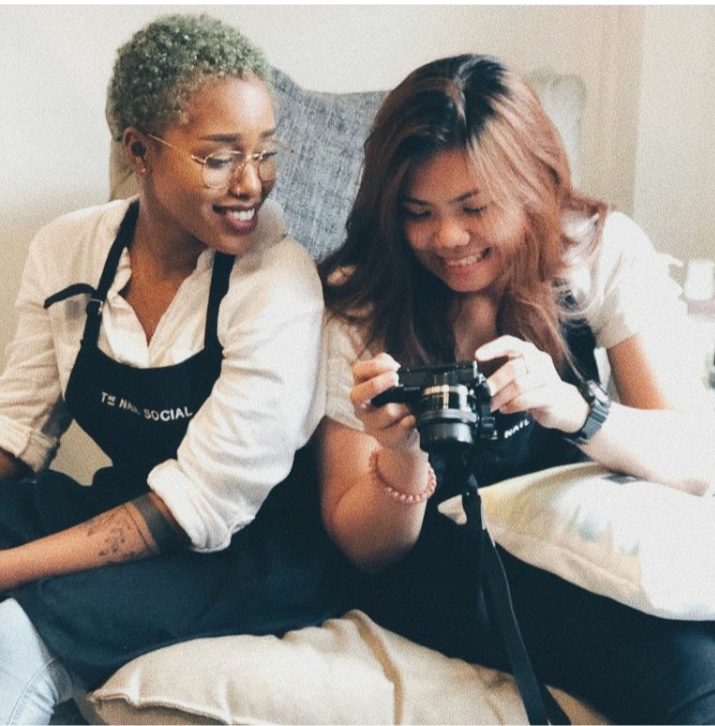 Thompson at work at The Nail Social. Photo courtesy of Tabitha Thompson.
Thompson at work at The Nail Social. Photo courtesy of Tabitha Thompson.
Singapore needs to acknowledge it does have a problem with racism
Also prevalent, sadly, is how racism has been normalised in speech, says Thompson.
“You know, like words and phrases people would say, like “keling” to Indians or, say like, ‘Oh, you know how Malays are lazy.’
They're just commonly used. So it's like, no one's afraid to use them.”
And the issue in Singapore expands past just racism, Thompson says: “You have xenophobia, you have colourism.”
She adds that it is important for people in Singapore, especially teachers and parents, to acknowledge racism when it comes up and learn how to address it:
“People need to educate themselves about this whole racism issue. Especially with parents and teachers — they play a big role in this.
It's not always about getting good grades in school, but I feel like you should at least teach your children how to be a decent human being.
Like, teach them about racism from a young age.”
And while Singaporeans may find themselves moved to support a global movement like Black Lives Matter, they should also stand against racism in their own backyard, says Thompson.
"Don't just support BLM, but stay silent about racism in Singapore."
George Floyd and Black Lives Matter movement
The death of George Floyd and police violence against black individuals has been heartbreaking, Thompson shared in a Facebook post by The Nail Social on Jun. 4.
"It hurts having to hear about the deaths of my fellow Black brothers and sisters, and that it had to take the protesting now for the world to finally wake up about racism!
#BlackLivesMatter is not about blacks vs whites, it's everyone vs racism."
The past few weeks have been particularly tough, she says, because her father now lives in the U.S., as does her extended family on his side:
“I’m always messaging my dad, like, ‘Are you guys okay? Keep me updated.’”
In a recent call with her American family members, they shared their feelings about the George Floyd situation and the movement that has taken hold since then:
"We don't condone violence, but if this is what it takes for black people to finally be heard, then we stand with them. We are also lucky that we live in a ‘safer area’, so there isn't much crime.
Touching on issues of police brutality and violent acts of racism, Thompson says that being black in America comes with it a constant "fear for [their] lives".
And being far away from where the on-the-ground change is happening is frustrating for Thompson, although she is grateful that such degrees of racism don’t occur in Singapore.
A robust support network
Thompson admits that there was a time when she was in secondary school, when the bullying and racism were most pronounced, that she considered going back to the U.S. to continue her studies there.
"Back then, I just thought, you know, 'I’d rather be in America rather than here.… I don’t like being the only black kid. I want to be around other black people.'"
But her mindset has changed as she’s gotten older:
“Now, I’m just like, Singapore is just my home. I can’t leave my friends behind. So I guess I’m going to stay here for a very, very long time.”
As an adult, Thompson has been able to find support in friends who have lived through similar experiences as she did.
She has a small group of around ten friends whom she has known since childhood. These friends are also half-black — mixed either Malay, Indian, or Chinese — whom she lost contact with for a bit over the years but recently reconnected with.
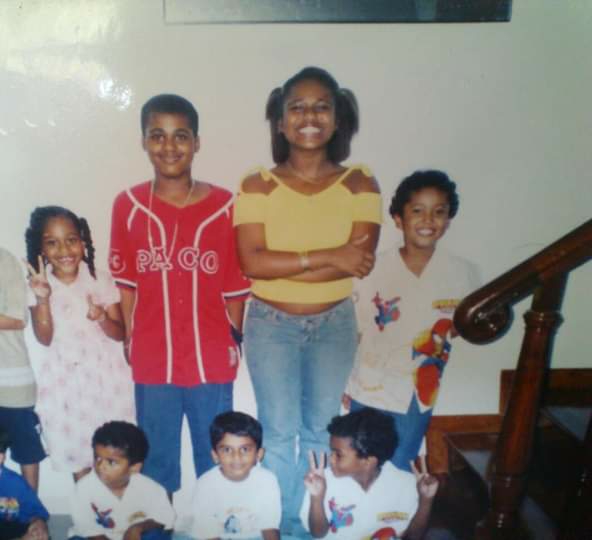 Thompson and her siblings with their African-American friends in Singapore. Photo courtesy of Tabitha Thompson.
Thompson and her siblings with their African-American friends in Singapore. Photo courtesy of Tabitha Thompson.
And Thompson has also found allies in her closest non-black friends as well. One of her best friends, who is Chinese Singaporean, has been a huge support to her:
“I can talk to her about anything. When I'm feeling down about racism, she's always there for me.
Even with the whole George Floyd thing, she always checks up on me, like ‘How are you doing? Are you feeling okay?’”
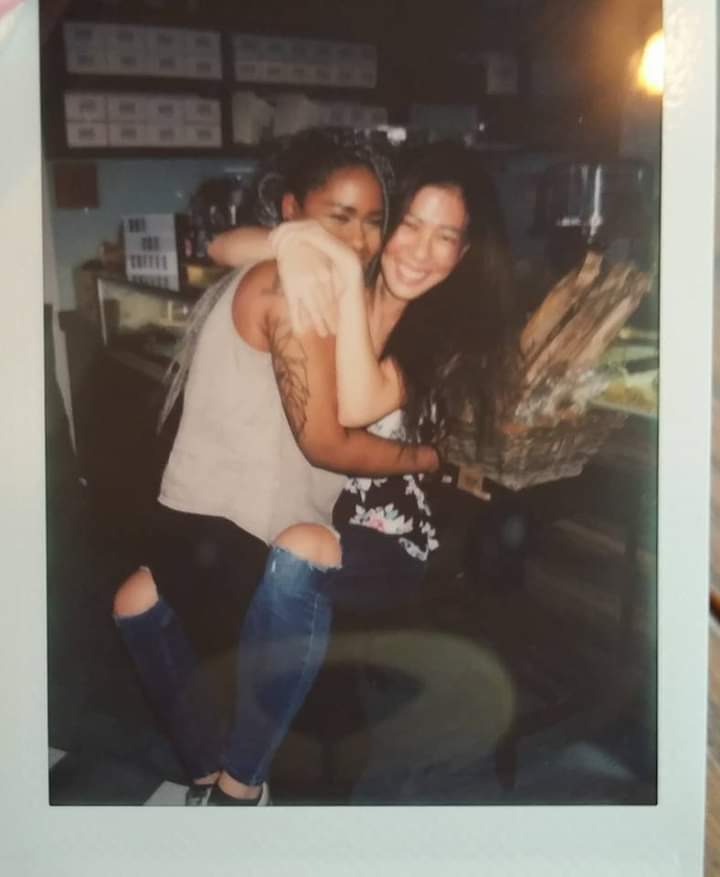 Thompson and her best friend. Photo courtesy of Tabitha Thompson.
Thompson and her best friend. Photo courtesy of Tabitha Thompson.
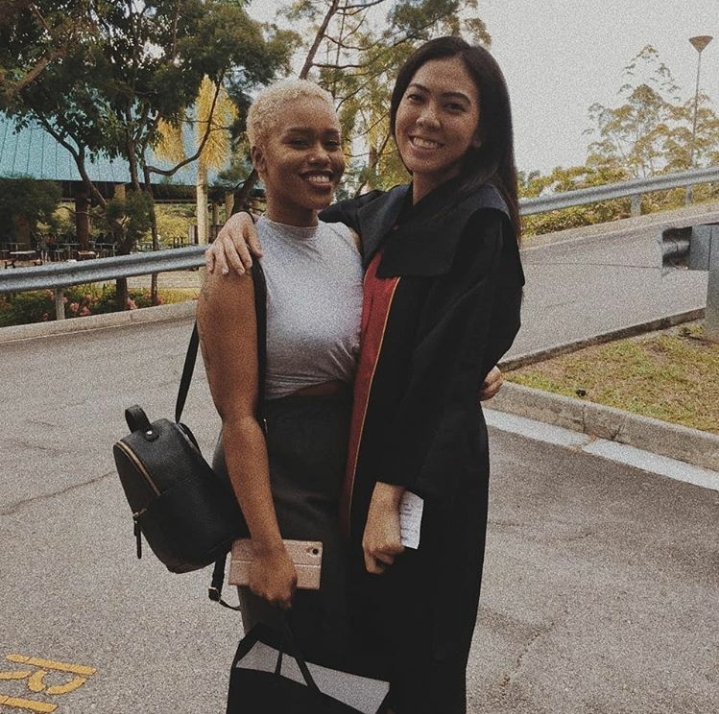 Thompson and her best friend. Photo courtesy of Tabitha Thompson.
Thompson and her best friend. Photo courtesy of Tabitha Thompson.
Grown to be more comfortable in her own skin in Singapore
Over the years, through the encouragement and support of her mother and her friends, Thompson has also developed more confidence and pride in who she is:
“Back then, when I was younger, yeah, I hated to be dark-skinned. But then the older I got...I'm more comfortable in my own skin.
Now I'm like, I don’t want to be lighter! I'm happy with my skin tone!”
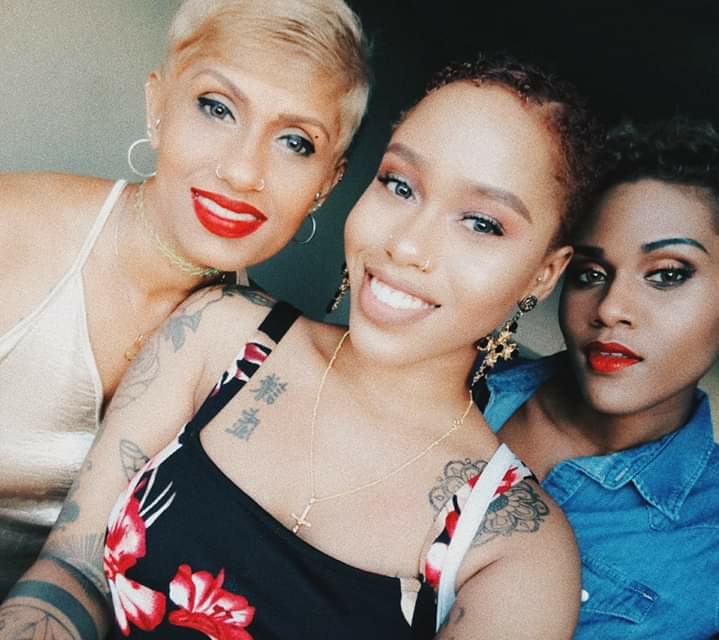 Thompson with her mother (left) and sister (right). Photo courtesy of Tabitha Thompson.
Thompson with her mother (left) and sister (right). Photo courtesy of Tabitha Thompson.
And she has also seen a change in mindset when it comes to her hair, which was a big source of self-consciousness back in her teenage years.
Due to the humidity of Singapore, she faced a lot of difficulty in managing it, and tried everything from flat ironing, to relaxing, to rebonding, before settling on her current hairstyle, a pretty sick-looking buzz cut.
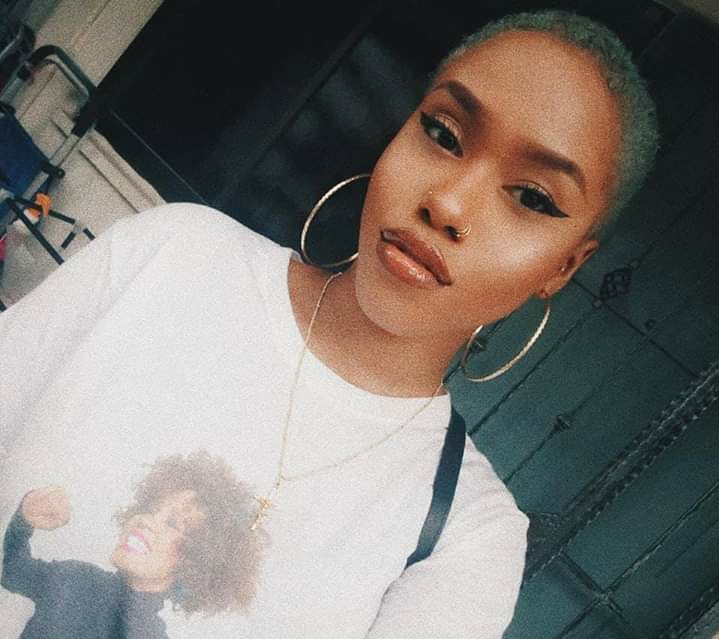 Photo courtesy of Tabitha Thompson.
Photo courtesy of Tabitha Thompson.
Now, instead of wanting to change her hair to fit the norm, she hopes to one day open up a salon to better support others like her:
“My plan in the future is to set up a salon for people with my textured hair … because it's hard to find a salon that can do my hair!” she says, laughing.
And although, at times, Thompson has felt some jealousy towards her friends who have graduated from ITE or polytechnic and those who are going to university, her mother has been a huge source of support for her, reminding her of what’s important:
“My mom always talks to me, and she’s like, ‘Are you happy doing what you are doing now?’
And I'm like, yeah, I've always been interested in this. And she's like, ‘Okay, forget it. Who cares if your friends graduate! You're never too old to go to school.’”
“The older I got, I matured more,” says Thompson. “I’m just like, you know, what’s the point of me changing? This is who I am, I'll just be happy.”
Stories of Us is a series about ordinary people in Singapore and the unique ways they’re living their lives. Be it breaking away from conventions, pursuing an atypical passion, or the struggles they are facing, these stories remind us both of our individual uniqueness and our collective humanity.
Top photos courtesy of Tabitha Thompson.
If you like what you read, follow us on Facebook, Instagram, Twitter and Telegram to get the latest updates.
